
Blood Transfusion
Scope & Guideline
Empowering Research in Hematology and Immunology.
Introduction
Aims and Scopes
- Transfusion Safety and Efficacy:
A core area of the journal is the investigation of transfusion safety, including the assessment of risks associated with transfusion-transmitted diseases and the efficacy of different blood components. - Innovative Blood Management Strategies:
The journal emphasizes the development and evaluation of patient blood management strategies that aim to optimize the use of blood products and improve patient outcomes. - Transfusion-Related Complications:
Research on complications arising from blood transfusions, such as transfusion-related acute lung injury (TRALI), hemolytic reactions, and allergic reactions, forms a significant part of the journal's scope. - Blood Component Technologies:
The journal covers advancements in blood component technologies, including pathogen reduction techniques, automated blood processing, and new storage solutions. - Hematologic Disorders and Transfusion:
Studies focusing on the role of transfusion in various hematologic disorders, including thalassemia, hemophilia, and sickle cell disease, are frequently featured. - Immunohematology and Blood Group Genetics:
The journal includes research on immunohematology, blood group antigens, and genetic factors influencing transfusion compatibility.
Trending and Emerging
- Patient Blood Management (PBM):
There is a growing emphasis on PBM strategies that aim to minimize the need for transfusions and improve patient outcomes, particularly in surgical settings. - Impact of COVID-19 on Transfusion Practices:
The pandemic has led to increased research on the effects of COVID-19 on blood donation, transfusion practices, and the management of patients with COVID-19, reflecting the urgent need for updated guidelines. - Personalized Transfusion Strategies:
Emerging studies focus on tailoring transfusion practices to individual patient needs, including genetic factors and patient-specific responses to transfusion. - Advancements in Pathogen Reduction Technologies:
Innovations in pathogen reduction methods for blood products are increasingly being investigated, reflecting a trend towards enhancing the safety of transfusions. - Research on Blood Donor Health and Safety:
There is an increasing focus on understanding the health impacts of blood donation on donors, as well as strategies to promote donor retention and safety. - Use of Novel Therapeutics in Transfusion Medicine:
The exploration of new therapeutic approaches, including monoclonal antibodies and gene therapies, is gaining traction within the journal's publications.
Declining or Waning
- Historical Perspectives on Blood Transfusion:
Papers exploring historical aspects of blood transfusion practices are becoming less common, as the focus shifts towards contemporary issues and innovations in the field. - Basic Research on Blood Components:
Research that is purely focused on basic science aspects of blood components without direct clinical application appears to be waning, as there is a stronger emphasis on translational research. - Traditional Hematology Practices:
Traditional practices in hematology, such as standard blood transfusion protocols without the integration of new technologies or patient-centered approaches, seem to be receiving less attention.
Similar Journals
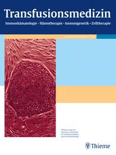
Transfusionsmedizin
Transforming transfusion medicine with vital research contributions.Transfusionsmedizin is a premier journal dedicated to the field of transfusion medicine, published by the renowned GEORG THIEME VERLAG KG. With an ISSN of 2191-8805 and an E-ISSN of 2191-8813, this journal serves as a vital platform for disseminating cutting-edge research and clinical advancements in blood transfusion practices. Although it operates under a subscription model, the journal is committed to high-quality peer-reviewed content that addresses contemporary challenges and innovations in transfusion therapy. By fostering dialogue among researchers, clinicians, and students, Transfusionsmedizin aims to advance patient care and enhance the safety and efficacy of transfusion practices globally. Its contributions are essential for professionals engaged in transfusion science, hematology, and related medical fields, solidifying its reputation as a critical resource for staying abreast of the latest developments in transfusion research.
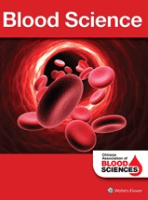
Blood Science
Connecting Researchers to Breakthroughs in HematologyBlood Science is a distinguished peer-reviewed journal published by Lippincott Williams & Wilkins, focusing on the dynamic field of hematology. Since its inception, the journal has aimed to disseminate high-quality research and innovative findings that contribute to our understanding of blood-related health issues. With the ISSN 2543-6368, it offers a platform for academic discussions and breakthroughs in various subfields including hematopathology, blood disorders, and transfusion medicine. As of 2023, Blood Science is ranked in the third quartile (Q3) within the hematology category, indicating a burgeoning influence among its peers, with a Scopus rank of #101 out of 137 journals, placing it in the 26th percentile. Although it is not an open-access journal, it provides essential insights and valuable data for researchers, healthcare professionals, and students alike, enhancing the collective knowledge and practices in hematology. With a publication period spanning from 2019 to 2024, Blood Science remains committed to fostering the advancement of blood science research and enhancing patient care methodologies.
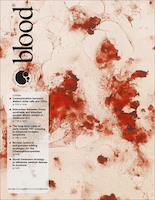
BLOOD
Advancing the Science of Hematology.BLOOD, published by the American Society of Hematology, is a premier peer-reviewed journal in the fields of Biochemistry, Cell Biology, Hematology, and Immunology. With an impressive impact factor and ranking in the top quartiles (Q1) across multiple disciplines, BLOOD is essential reading for researchers and professionals seeking to stay updated on the latest advancements in hematology and related fields. The journal has been a cornerstone of hematological research since its inception in 1946, providing a platform for rigorous scientific inquiry and discourse. Its commitment to publishing high-quality original research, comprehensive reviews, and insightful editorials makes it a vital resource for students, practitioners, and scientists alike. By offering exceptional access to influential publications, BLOOD continues to shape the future of hematology and enhance understanding of blood-related disorders, marking its vital role in advancing both basic and clinical research.

Blood Research
Advancing Hematological Science for a Healthier TomorrowBlood Research, published by SPRINGER, is a premier journal dedicated to the multifaceted realm of hematology, serving as a crucial platform for disseminating innovative research findings and advancements in the diagnosis and treatment of blood-related disorders. With an ISSN of 2287-979X and an E-ISSN of 2288-0011, this journal is recognized for its commitment to scholarly excellence and impact in the field, currently holding a reputable Q2 ranking in the Hematology category as per the 2023 metrics. The journal spans from 2013 to 2024, providing a broad archive of quality research that is vital for researchers, healthcare professionals, and students alike. Although it is not an Open Access journal, it offers insightful contributions that enhance the understanding of hematological science, fostering the exchange of knowledge crucial for advancing patient care and clinical practices globally. The journal’s performance is underscored by its Scopus ranking in the 46th percentile, reflecting its significant role in the ongoing discourse in hematology.
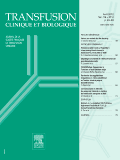
TRANSFUSION CLINIQUE ET BIOLOGIQUE
Elevating clinical practices through rigorous research.TRANSFUSION CLINIQUE ET BIOLOGIQUE, an esteemed journal published by Elsevier France - Éditions Scientifiques Médicales Elsevier, has been a pivotal resource in the fields of transfusion medicine, biochemistry, and hematology since its inception in 1994. With a strong commitment to advancing scientific knowledge, this journal provides a platform for high-quality research and clinical studies aimed at improving patient care and outcomes in transfusion practices. Although categorized in Q3 and Q4 quartiles across multiple categories in Biochemistry and Medicine for 2023, the journal holds significant potential for growth and impact within the scientific community. While it currently does not offer open access options, its indexing in reputable databases ensures visibility and reach among professionals and researchers. As the field evolves, TRANSFUSION CLINIQUE ET BIOLOGIQUE aims to continue fostering innovation and collaboration, making it a valuable tool for anyone involved in medical, biochemical, and hematological research.
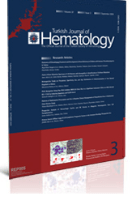
Turkish Journal of Hematology
Fostering collaboration in hematology research and clinical practice.Turkish Journal of Hematology is an esteemed publication dedicated to advancing the field of hematology, producing influential research since its inception in 1999 under the auspices of GALENOS PUBL HOUSE. With an Open Access model, it facilitates widespread dissemination of knowledge, allowing researchers, clinicians, and students to stay abreast of the latest developments in blood disorders and treatments. With an ISSN of 1300-7777 and an E-ISSN of 1308-5263, the journal holds a commendable position in the academic community, evidenced by its 2023 Q3 ranking within the hematology category and its standing at #80 out of 137 in the Scopus database, placing it in the 41st percentile. Covering a wide scope of topics within hematology, this journal serves as a critical resource for disseminating innovative research and clinical practices pertinent to the ongoing challenges faced in this vital area of medicine. With its continuous publication until 2024, Turkish Journal of Hematology remains a beacon for enhancing the understanding and treatment of hematological conditions within the Turkish and global medical communities.
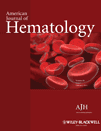
AMERICAN JOURNAL OF HEMATOLOGY
Empowering Discoveries in Blood DisordersAmerican Journal of Hematology, published by Wiley, stands as a premier outlet for the dissemination of cutting-edge research in the field of hematology. With a commendable impact factor and ranked #9 out of 137 in the Scopus medicine category, this journal has established a robust presence since its inception in 1976. Operating in the Q1 quartile for hematology, it serves as a crucial resource for researchers, clinicians, and students dedicated to understanding blood disorders and advancing treatment methodologies. While the journal does not currently offer open access options, it remains highly regarded for its rigorous peer-review process and impactful contributions to the scientific community. With coverage extending into 2024, the American Journal of Hematology is committed to fostering innovation and collaboration within the hematological sciences.
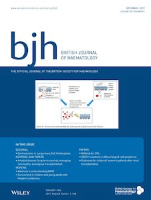
BRITISH JOURNAL OF HAEMATOLOGY
Exploring Innovations in Blood Health and DiseaseBritish Journal of Haematology, published by Wiley, is a leading journal in the field of hematology, with an impressive impact factor reflecting its significance in the medical research community. Established in 1955, the journal has consistently contributed to advancing knowledge in hematology, currently holding a prestigious Q1 ranking in the Scopus category of Hematology, placing it in the top 18% of the field. The journal encompasses a broad range of topics including clinical and laboratory aspects of blood disorders and hematological malignancies, making it an essential resource for hematologists, researchers, and healthcare professionals. With its commitment to publishing top-tier research and clinical studies, the British Journal of Haematology plays a critical role in shaping treatment approaches and improving patient outcomes worldwide. Please note that this journal does not offer Open Access options, ensuring that published content is rigorously curated for quality and relevance.

INTERNATIONAL JOURNAL OF HEMATOLOGY
Pioneering Discoveries in Hematological ScienceThe INTERNATIONAL JOURNAL OF HEMATOLOGY, published by SPRINGER JAPAN KK, serves as a critical platform for advancing research in the field of hematology. With a prestigious history spanning over three decades from 1991 to 2024, this journal is recognized for its impactful contributions, evidenced by its Q2 category ranking in Hematology for 2023, and its notable position at rank #71 out of 137 in the Scopus Medicine Hematology category. Researchers and professionals within the hematology community benefit from the journal's rigorous peer-reviewed articles that cover a wide range of topics, including clinical studies, basic research, and novel therapeutic strategies. Though currently non-open access, it provides essential insights and findings to an audience passionate about the latest advancements in blood disorders and treatments. Situated in Japan, the journal not only showcases high-quality research but also fosters a global exchange of knowledge in hematology, making it a significant resource for scholars, practitioners, and students alike.

Indian Journal of Hematology and Blood Transfusion
Exploring Innovations in Blood Disorders and Transfusion ScienceIndian Journal of Hematology and Blood Transfusion, published by SPRINGER INDIA, serves as a leading platform for disseminating original research, reviews, and case studies in the field of hematology. With an ISSN of 0971-4502 and E-ISSN 0974-0449, this journal has been instrumental in advancing knowledge from 2000 to 2024, providing insights into critical issues surrounding blood disorders and transfusion practices. Currently ranked in the Q3 category for Hematology for 2023, it reflects a commitment to high-quality scientific content amidst a competitive landscape where it ranks 97/137 in Scopus for Medicine - Hematology, placing it in the 29th percentile of its peers. The journal primarily addresses a diverse readership, including researchers, healthcare professionals, and students, aiming to foster innovation and collaboration within the field. Although it operates under a subscription model, access options for individual articles and institutional subscriptions ensure that valuable research is disseminated widely to enhance medical practice and education in hematology.